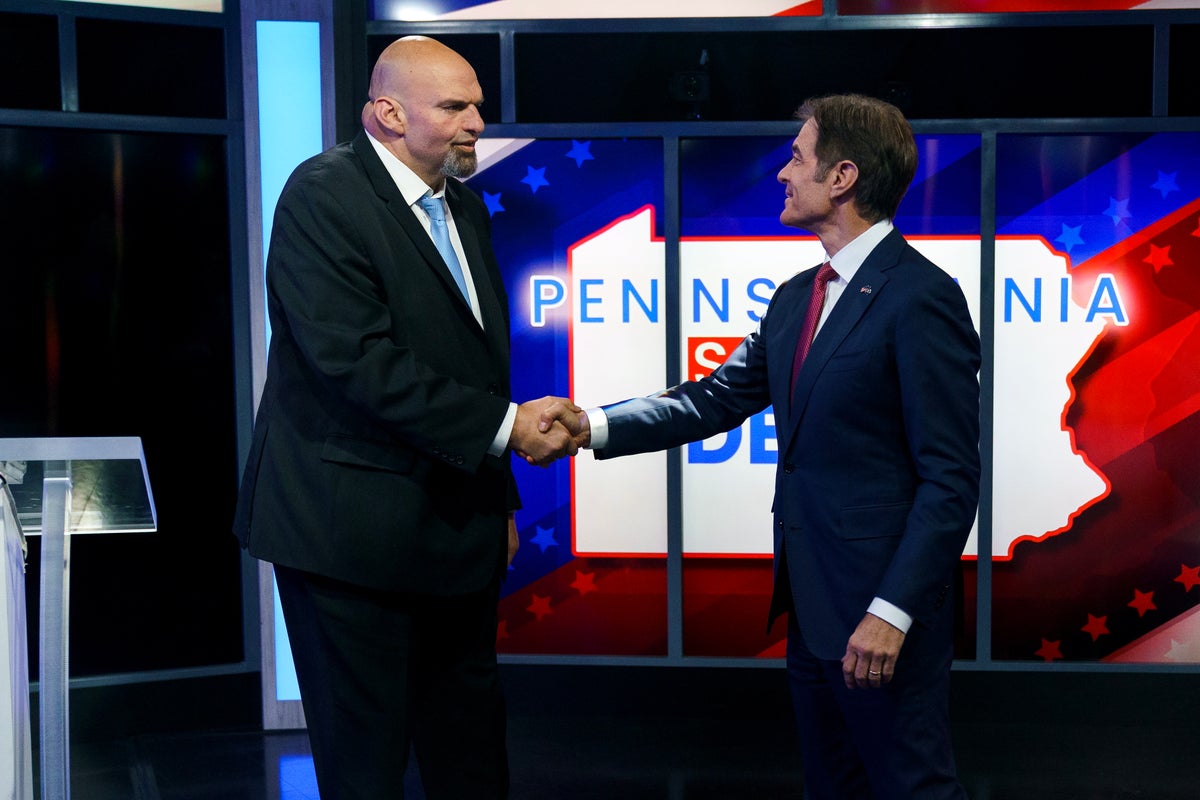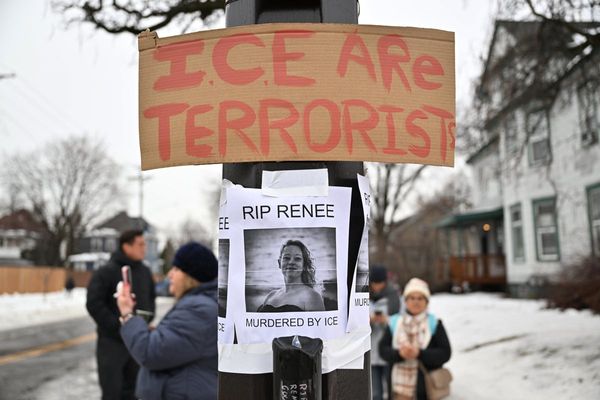
Before a word was spoken in Tuesday’s crucial debate between John Fetterman and Dr Mehmet Oz, everyone seemed to know who would win on the night. In the hours leading up to the only scheduled debate between the two candidates, who are vying for a seat that could be the deciding vote in the Senate, Mr Fetterman’s own team gave a masterclass in lowering expectations.
“John did not get where he is by winning debates or being a polished speaker. He got here because he truly connects with Pennsylvanians,” senior campaign officials Rebecca Katz and Brendan McPhillips wrote in a memo. “This isn’t John’s format,” they added.
Dr Oz, on the hand, is a polished television professional.
“This guy is a media-savvy performer who literally built his career (and his fortune) by playing to the cameras as a daytime TV host,” they continued.
All political campaigns aim to manage expectations before a debate — it’s a tried and tested method of reframing what a victory looks like. But for Mr Fetterman’s team, there was an important reason to go the extra mile.
Since suffering a stroke in May, Mr Fetterman has had trouble with auditory processing — a common issue with recovering stroke victims. It means that he sometimes has trouble hearing sentences and will stumble over some words, especially when several people are speaking. In short, it is hard to imagine a more inhospitable environment for someone in his position than a debate stage, with the inevitable crosstalk, interruptions and fast-paced questions.
To help him process the questions during the debate, moderators agreed to provide real-time captions that transcribed everything the moderators and Dr Oz said. The words came down on two large television screens that hung over the moderators, who explained at the outset how they would work.
In his opening statement, Mr Fetterman addressed what he called the “elephant in the room,” and compared his own health struggles with the fortunes of Pennsylvanians.
“I had a stroke. He’s never let me forget that,” he said, referring to attacks by Dr Oz’s campaign on his health. “And I might miss some words during this debate, mush two words together. But it knocked me down and then I’m going to keep coming back up. And this campaign is all about to me is about fighting for everyone in Pennsylvania that ever got knocked down, that needs to get back up, and fighting for all forgotten communities all across Pennsylvania.”
It was clear from the outset that the debate would be difficult for Mr Fetterman, but the question remained: in the midst of his recovery, could Mr Fetterman overcome his health difficulties to deliver his message, and explain his policies to the people of Pennsylvania?
As his campaign forewarned, Mr Fetterman stumbled on his words frequently. He struggled to answer questions that he has answered many times before, on topics that he clearly knows well. His most difficult moment came when he was challenged on his previous opposition to fracking, something he now supports, and was unable to provide an explanation.
But if the point of the debate was to inform viewers of each candidate’s policies, and not about peformance, then Mr Fetterman turned up at the key moments. On abortion, he drew a distinct line between himself and Dr Oz.
“I want to look into the face of every woman in Pennsylvania. You know if you believe that the choice of your reproductive freedom belongs with Dr Oz, then you don’t have a choice. But if you believe that the choice for abortion belongs with you and your doctor, that’s what I fight for. Roe v Wade for me should be the law,” he said.
Dr Oz said “there should not be involvement from the federal government in how states decide their abortion decisions,” when asked if he’d support a federal abortion ban. But he also gave an answer that is likely to be used by Democrats in the days to come when he suggested that “local political leaders” should be involved in making decisions about abortions.
“As a physician, I’ve been in the room when there’s some difficult conversations happening. I don’t want the federal government involved with that at all. I want women, doctors, local political leaders, letting the democracy that’s always allowed our nation to thrive to put the best ideas forward so states can decide for themselves,” he added.
In between the barbs, each candidate began to build their pitch. Dr Oz accused Mr Fetterman of holding “radical positions, [being] extreme, out of touch,” and someone who is soft on crime. He said Mr Fetterman, “during this crime wave, has been trying to get as many murderers... out of jail as possible.”
Mr Fetterman, meanwhile, revisited his attacks on Dr Oz as an out-of-touch millionaire who has “ten gigantic mansions”. He attacked Dr Oz’s refusal to support a $15 minimum wage, accusing him of choosing China over American workers for producing his own merchandise.
Mr Fetterman said he would “absolutely” support Joe Biden in 2024 if he decided to run. Dr Oz, when asked the same, replied: “I’ll support whoever the Republican Party puts up.” When pressed by moderators, he said he “would support Donald Trump if he decided to run for president”.
Outside of the ABC29 studio where the debate was taking place, in the misty Pennsylvania state capital of Harrisburg, crowds of supporters and protesters for both sides faced off against each other. A bus displaying a digital banner chastising Dr Oz for his experiments on dogs passed back and forth past the building.
Holding a sign that read “Big John has my vote”, Harrisburg resident John Abbott said Mr Fetterman’s stance on social issues such as abortion and gay rights had earned his support. When asked if the candidate’s use of captions concerned him, he replied: “I hope that he’s feeling well. I know a lot of people who have had the same and are doing fine. To take a minute to think about what you’ve got to say is not a luxury most politicians have. But I think he’s gonna be fine and he’s gonna do well.”
It has been an unusual campaign so far by any measure, and the sole debate in the race was no different.
Mr Fetterman has enjoyed a healthy lead since winning his primary. But as election day drew nearer, polls showed reluctant Republicans coming home. Dr Oz turned his attention to crucial suburban voters with a focus on crime, accusing Mr Fetterman of being too lenient. Those attacks appeared to have some success in narrowing the gap, and Mr Fetterman’s lead today stands just outside the margin of error.
Whether this debate will swing the race in favour of Dr Oz remains to be seen. Few will make the argument that Mr Fetterman won Tuesday’s debate, but his team will be hoping that Pennsylvanians will see through the stumbles to a broader message.
“John may have missed some words, but his message was loud and clear. John will fight for Pennsylvania – Dr Oz will only fight for himself,” wrote his advisor Rebecca Katz, following the debate.
Inside the spin room after the debate, questions from journalists focused on Mr Fetterman’s struggle to articulate himself.
Oz campaign strategist Barney Keller called the debate “a complete disaster for John Fetterman”.
“He wasn’t able to defend any of his radical positions and it really showed,” Mr Keller told reporters.
Joe Calvello, Mr Fetterman’s director of communications, said his candidate performed better than he did in the primary.
“John Fetterman performed great tonight for a man who was in a hospital bed just several months ago,” he said. “He put it all on the line and was transparent with the people of Pennsylvania and he performed pretty damn well.”
The two candidates ended as they began. Dr Oz pitched himself as a candidate for change and a vote against Mr Biden.
“Ask yourself this and others in your family, are you unhappy with where America’s headed? I am,” he said.
Mr Fetterman seemed to acknowledge his health problems and promised to be a candidate for Pennsylvanians who were facing their own struggles.
“My campaign is all about fighting for anyone in Pennsylvania that ever got knocked down and had to get back up again.”







